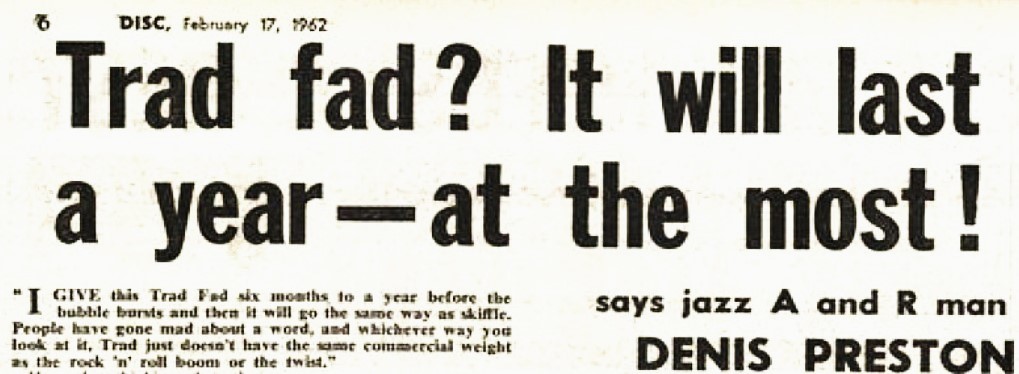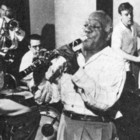

Page updated 2024 with many contributions from Philippe Edouard and Pascal Yvernel. Merci beaucoup !
Single on CBS Coronet, charted first in Brisbane 4 August 1962. Also in the US on Epic.
♫ Listen at YouTube [The Hehr Archive]
Instrumental by Sydney trad jazz group led by guitarist and banjo player Ray Price.
Personnel: Johnny McCarthy, clarinet; John Costelloe, trombone; Dick Hughes, piano; Ray Price, banjo; Wally Wickham, string bass. (Jack Mitchell, Australian Jazz On Record, 1988).
Single on Octagon by rock’n’roll band from the city of Dunedin, NZ.
The label, formed in 1960 by journalist John Ewan, is named after The Octagon, the famous eight-sided variation on a town square in central Dunedin.
Further reading: Octagon label at AudioCulture.
On Pye Jazz EP Hit Parade Volume Two and as a single on Pye Jazz that charted in October 1962.
Kenny Ball & His Jazzmen were part of the craze for trad jazz that also took in popular artists such as Acker Bilk and Chris Barber.
Ball and his band were often on the charts around 1961-63, charting best with Midnight In Moscow (1961, #2 UK), March Of The Siamese Children (1962, #4) and The Green Leaves Of Summer (1962, #7).
*Thomas J. Guest’s Melbourne chart book, Thirty Years Of Hits, has this reaching #24 in Melbourne, co-charting with the Ray Price version. (Thirty Years Of Hits is available from: M. Maloney, PO Box 161, Craigieburn, Vic 3064, Australia.

Influenced by Les Baxter, Martin Denny (1911-2005) developed his winning brand of instrumental exotica with jungle sound effects while resident at the Shell Bar in the Hawaiian Village resort, on Oahu, Hawaii.
Denny’s medium was the stereophonic LP, but he had a hit single with Quiet Village (1959 #4 USA), written by Les Baxter who had released the original version in 1951.
*The writer credits include André Coffrant, lyricist for the vocal version in Série Noire although I doubt that Denny’s record would have had vocals (I can’t find audio to confirm this).
Sources, further reading: 1. The excellent Space Age Pop on Martin Denny and Les Baxter. 2. Martin Denny Biography by Richie Unterberger at All Music.
Vocal version
Accompanied by Lucien Marin et ses rythmes.
Self-titled EP on Music-Holl by obscure French singer and flamenco-inspired guitarist Freddy Marco (born c. 1937). This was apparently the label’s only release (and it is Music-Holl, not hall).
EP on Disques Vogue [EPS 1201] Aimable Son Accordéon Et Son Orgue by Aimable Pluchard (1922-1997), popular French actor-accordionist (in fact a multi-instrumentalist).
He was an extraordinarily prolific recording artist, as the numbers at Discogs.com alone show, but the French Wikipedia article has the number of his recorded tracks at over 10,000.
Vocal version
78 rpm disc on Vogue [3508, also on 45 rpm] by actor, singer and dancer Monique Van Vooren (Monique Bronz, 1927-2020). She was born in Brussels but in the 1950s became a resident of the USA where she appeared in a number of notable films and TV shows.
Lyrics by André Coffrant. Accompanied by Claude Bolling and his Orchestra.
Label shot: scroll down at this page at amourdurocknroll.fr
As the label indicates, Monique Van Vooren sang À moi d’payer in the film Série noire, although in the film the words are à toi (see below).
Further reading: 1. “Monique Van Vooren, Actress With a Diverse Résumé, Dies at 92”, New York Times, 1 February 2020.
2. A Moment with Monique Van Vooren by Trav S.D. at Travalanche.
Je l’ai cherché, mais Philippe l’a trouvé et Pascal l’a capté. Merci !
Releases on Vogue, 7″ 45 rpm [45-135] and 10″ 78 rpm [3508], also on Vogue EP Succes De Films, Vol. 2 [EPL, 7122] by harmonica trio Jean Amata, Vincent Amata and Claude Grisvard, directed by Jacques Vernon.
Members of the trio met in the late 1940s in a group formed by Ukrainian harmonica virtuoso Borrah Minevitch. The aim was to have a European version of The Harmonica Rascals, Minevitch’s multiple American vaudeville groups.
Bonus track: ♫ View at YouTube: Le Trio Marnhy playing Danza de las horas in 1956.
Sources: Liner notes, others as linked.
Vocal version
10″ 78 rpm disc on Vogue Productions [V. 3504x], also on 45 rpm single [45-133].
Robert Ripa was from Marseille, a singer, actor and songwriter of Italian family background (Hector Ripa, 1919-2005).
Unlike Monique in the original soundtrack version, Robert sings à moi (not à toi).
Going strictly by serial numbers, this may have been the original release of À moi d’payer.
Further reading: 1. Robert Rica at Discogs.com and 2. at French Wikipedia.
Single on Vogue Productions, released on both 7″ 45 rpm [45-134] and 10″ 78 rpm [V. 5195] discs.
 Sidney Bechet: New Orleans-born clarinettist, saxophonist and composer (1897-1959), one of the greats of jazz who often worked in Europe and lived in France in later life. His best-known composition outside jazz circles is probably Petite Fleur, a hit on the pop charts for Chris Barber in 1959.
Sidney Bechet: New Orleans-born clarinettist, saxophonist and composer (1897-1959), one of the greats of jazz who often worked in Europe and lived in France in later life. His best-known composition outside jazz circles is probably Petite Fleur, a hit on the pop charts for Chris Barber in 1959.
André Réwéliotty (1929-1962) was a jazz clarinettist and conductor and a frequent collaborator of Bechet during the 1950s.
This may be the first release on disc in spite of the serial numbers.
Vocal version
On the soundtrack of the film Série Noire, recorded around late January 1955 and first heard upon the film’s release on 4 March 1955.
The lyrics are by André Coffrant. Monique sings à toi d’payer.
The film (directed by Pierre Foucaud) became known as Leur compte sera réglé after a remake of Série noir was released in 1979. The 1955 film was also known in English-speaking markets as The Infiltrator or Black Edition.
Based on Jim Thompson’s novel A Hell of a Woman, the film’s title Série Noire (black series) may be a nod to Gallimard’s crime fiction imprint Série noire which published Thompson’s novel in France as Des cliques et des cloaques.
Parody Vocal version
TVA stands for Taxe sur la valeur ajoutée or Value Added Tax (VAT), known in some countries (including Australia) as GST (Goods and Services Tax), also as GCT. The singer sings to alleviate his taxation misery.
French comedy band The Charlots, also known as The Crazy Boys, had already been successful as a rock band called Les Problèmes (formed 1965) who recorded and performed with French singer Antoine.
The band’s name is a reference to Charlot, the French name for Charlie Chaplin‘s film persona The Tramp. Sois Erotique = be erotic.
Further reading: Les Charlots at en.wikipedia.org.
A modern jazz arrangement on Vogue LP Joue Sidney Bechet by French guitarist Babik Reinhardt (Jean-Jacques Reinhardt, 1944-2001) with Georges Arvanitas (piano), Charles Saudrais (drums), and Jacky Samson (double bass). The last three, credited individually on the sleeve notes, were members of the (variously named) Georges Arvanitas Jazz Trio.
The LP’s title means Babik Reinhardt … plays Sidney Bechet.
Babik was the younger son of renowned jazz guitarist Django Reinhardt (1910-1953) who died when Babik was nine years old.
Further reading: Babik Reinhardt articles at French and English Wikipedia.
Recent version with handsaw released online by inventive jazz revivalists from Quebec.
Further reading: 1. LesBleuPelouse.com. 2. Les Bleu Pelouse at Bandcamp.
Similar title but not the same song as “A Moi De Payer (The Pay-off)” by The Ray Price Quartet.
![]() Other red herrings include:
Other red herrings include:
• Cline’s Collegians – The Pay-off (Howard “Howdy” Quicksell)
USA late 20s
• Jerry Goldsmith – The Payoff (Goldsmith)
USA 1970 From the film Patton.